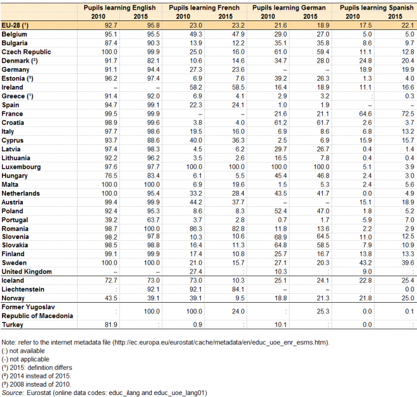English: A New Trend for Young Europeans?

With the United Kingdom leaving the European Union in (hopefully) 2020, it's possible that Brexit spells the end of the English language as being an official language of the EU. However, with the rise in popularity in the language among younger Europeans, it certainly won't be the least spoken unofficial language of Europe.
A French ad in English. Image credit: Eric Bompard Paris.The spread of English across Europe can often be seen plainly, from billboards to cinema listings. Many advertisements people see in the streets of Paris are in English, like the one pictured above, even though Paris is a French city. Most advertisements that are geared towards the younger generation are in English, because lately in France, and all over Europe, English is becoming increasingly popular as the second language of younger citizens.
A recent study by Eurostat for the European Commission shows a “clear majority of pupils learn English in the vast majority of EU member states. All or almost all primary school pupils in Malta, Cyprus, Austria, and Spain learned English as a foreign language in 2015. In Italy, Poland, France, and Croatia, 9 out of every 10 primary school children learned English.”
Another thing to note here is that there may be a boost in language learning in these countries because the first foreign language learned tends to receive priority in instruction. Since these students are learning English as their primary foreign language, they will thus be better at English than any other language they learn after having learned English.
European statistics on language learning. Image credit: Eurostat.The chart above points to language learning in secondary general education. 95.8% of the EU-28 (28 countries of the European Union) students at this level were studying English as a foreign language in 2015. The next closest languages were at 23.2% and 22.1%.
There is European legislation on languages. The EU has 24 official languages, of which three (English (possible to change), French, and German) have the status of “procedural languages.” Since the French want their citizens to be multilingual, there’s a requirement for citizens to know three languages: their native French, and two others, most often English and German. Increasing numbers of the younger generation of French and other European countries are learning English because English is being used more and more often in the professional scene.
“When the French and Germans are together on a project, and they are exchanging products, they often communicate in English. Rather than the French person learning German, they’ll each learn English and communicate with that,” said linguistics professor Rebekah Rast from the American University of Paris. “In this way, English is becoming the language of diplomacy, the language most business is done in.”
AUP Professor Rast. Image credit: The American University of Paris.Rast also pointed to anglophone music and YouTube videos, or cartoon shows dubbed in English as more causes of the change. “The music that’s most listened to is in English. Hollywood is still attractive, so to be able to access these films in the original language is important. If you look at the statistics on YouTube, you’ll find English is the most used language, even for the whole internet. To do a search, you’ll get more info from English than any other language. It opens up so many possibilities if you learn English.”
Today’s younger generations of Europeans are taking advantage of these possibilities. For example, 14-year-old student Simon from Germany learned 50% of his English from school and the other 50% from the Internet. “I started studying English in school when I was six years old,” Simon says. “It was my parents who wanted me to study English, and I’m really grateful for the opportunity to learn it. It’s really important for the rest of my life. Almost every country can speak English, and it’s for communicating with people who don’t speak German.” Simon learned the other 50% of his English from the Internet. “It mostly was gaming videos, like ‘Let’s Plays’. But when I got older I got more into comedy sketches and skits, like from well-known YouTuber iDubbz. I learned a lot of vocabulary from these videos. At first, I didn't know the words they were saying, but I learned it out of context.”
Germany isn’t the only country rapidly undergoing an increase in English speakers. Austria, the geographical neighbor of Germany and France, has also had increases in their numbers of English learners. 20-year-old Andreas Lanner, from Pongau, Austria, is one of them. Lanner chose to study English for several reasons. “You can communicate with the entire world in English. French or Russian won’t get you that far. It’s the native language of America; French are able to learn English, the same goes for Japanese, some more modern Russian cities as well. I think it gets you further than any other language.” Lanner studied English throughout his school career but says it wasn't until he was 15 that he started grasping the concepts. Lanner went on to state that more people in his country were speaking English because of social media, since, “the world is getting more connected.”
"You can communicate with the entire world in English."
In France, even though there are restrictions on the usage of the English language, it is still becoming more and more popular in the younger generation. The Toubon Law, which took effect in 1994, mandated the use of the French language in all official government publications, advertisements, workplaces, commercial contracts, and government-financed schools. Professor Rast explained the law, saying, “The policy was to put a ban on English in broadcasting, official texts, etc., but an example would be that in order to say “e-mail”, you have to say ‘courrier électronique.’ And that was the policy here in France. And there was a struggle between what the government was putting out there and what the people were actually doing.”
Parisian student Anthony Bosese-Kama’s skills in English are an example of the English language subverting the French government’s attempts to keep the nation purely francophone. Anthony talked a lot about his family and why it was important for him to learn English. “Our family is international, so we don’t all speak French, even though French is the language of Congo. But still, I have cousins, for instance, in the Netherlands. I also have cousins in Japan, so they don’t speak French, so we needed some way to communicate with them.”
Anthony learned English in his third year of primary school, and he loved it so much that he asked his parents to buy him cartoons in English from the TV series Jimmy Neutron. “I watched [the episodes] in French but I had the DVD in English, so I was able to hear the accents that were used and reproduce them.” Anthony sees the French government differently from what their policies would make the public believe: “I see the efforts by the government, they want us to master English, they know it’s important, we’re in a globalized world. But we are French, we represent our country. We are really proud of our cultural heritage, and in our language, for we will always value French more than English. The countries are adapted to globalization, but France is really proud of its history.”










